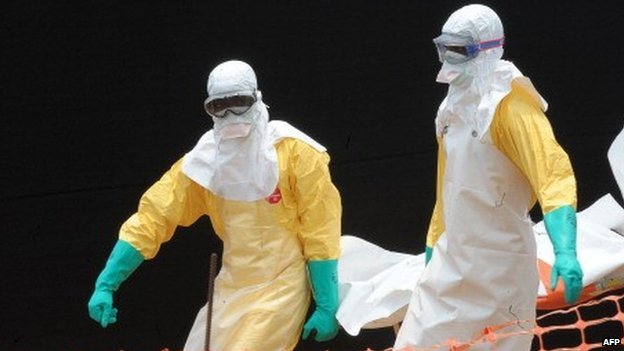
More than 20,000 people have been diagnosed with Ebola virus and more than 7,800 have died of it, according to the latest data from the World Health Organization. It’s a grim new milestone in the ever-worsening Ebola epidemic in Sierra Leone, Liberia and Guinea, serving as a reminder that the crisis is far from over.
The WHO said in a statement on Monday that there have been 20,081 cumulative cases of infection in the three worst hit countries, and more than 7,842 Ebola-related deaths recorded. However, those numbers are only the reported cases and deaths and are likely an underestimate of the impact of the virus in West Africa, the WHO said.
The virus is still spreading intensely in Sierra Leone, the organization said, with 315 new confirmed cases reported in the week leading up to December 21. These included 115 cases in the capital Freetown. In Guinea, 156 confirmed cases were recorded during the same period, “the highest weekly case incidence reported by the country in this outbreak”, it said. Liberia, where the outbreak appeared to be coming under control, experienced a setback this week as authorities on Monday reported dozens of new Ebola cases along its border with Sierra Leone.
Five additional countries – Nigeria, Senegal, Mali, Spain and the US – have had imported cases and are included in the global toll.
UK’s first Ebola case
A healthcare worker recently back from Sierra Leone was diagnosed with Ebola on Monday by doctors in Scotland’s largest city, the first diagnosis of the deadly virus in Britain during the current outbreak.
The patient, identified by British media as Pauline Cafferkey, had returned to Glasgow Sunday from volunteering on the “frontline” at a treatment facility in Kerry Town in Sierra Leone run by the Save the Children charity. Overnight, Cafferky was transferred from a Glasgow hospital to the Royal Free Hospital in London, which has a high-level isolation unit ready to handle Ebola cases and equipped with its own ventilation system to avoid contagion.
The nurse is currently listed in stable condition, and Scottish health authorities say the case poses an “extremely low” risk to the general public.
2014 Ebola epidemic
Ebola virus disease, formerly known as Ebola hemorrhagic fever, was first recognized in 1976 in Zaire (now Democratic Republic of Congo) and got its name from the river near which the first outbreak occurred. Since then, the virus has caused sporadic outbreaks in central and eastern Africa, but most of them were contained within the locality of patient zero – the first person to be infected when the virus jumped to humans from animals, as it does periodically.
But that changed in March, when the deadly Zaire strain was confirmed in Gueckedou, a small town in southern Guinea. The first case was traced back to a 2-year-old child who died there in December 2013 after coming into contact with an infected fruit bat.

Ebola outbreak distribution in West Africa as of Dec. 24, 2014.
Over the coming months the virus spread to neighboring Liberia and Sierra Leone, and on August 8, the WHO declared the spread of Ebola to be an international health emergency. By mid-September, the numbers of reported cases and deaths were growing exponentially from week to week despite multinational efforts to control the spread of infection in the three hardest-hit countries.
In October, the first-ever incident of international transmission of Ebola was reported in Spain, where a nurse was infected while caring for a sick patient who had been transferred there for treatment. Soon after, the U.S. reported its first domestic cases of Ebola when a Liberian traveler — and later two of the nurses who cared for him — were diagnosed with the disease.
After a “disastrously inadequate” start, the international response to the crisis has finally picked up and signs of progress are evident, yet much work remains to be done. Currently, the virus is spreading most rapidly in western Sierra Leone, although health officials have also warned of “troubling signs” in parts of Guinea. Based on the current situation, the epidemic is likely to last until the end of 2015, said Peter Piot, a scientist who helped to discover the virus in 1976.
On Sunday, U.S. Ebola czar Ron Klain once again reminded Americans that the U.S. and the rest of the world will remain at risk until the outbreak is brought under control at its source in West Africa. Less than 24 hours later, the U.K. confirmed its first case of Ebola.
